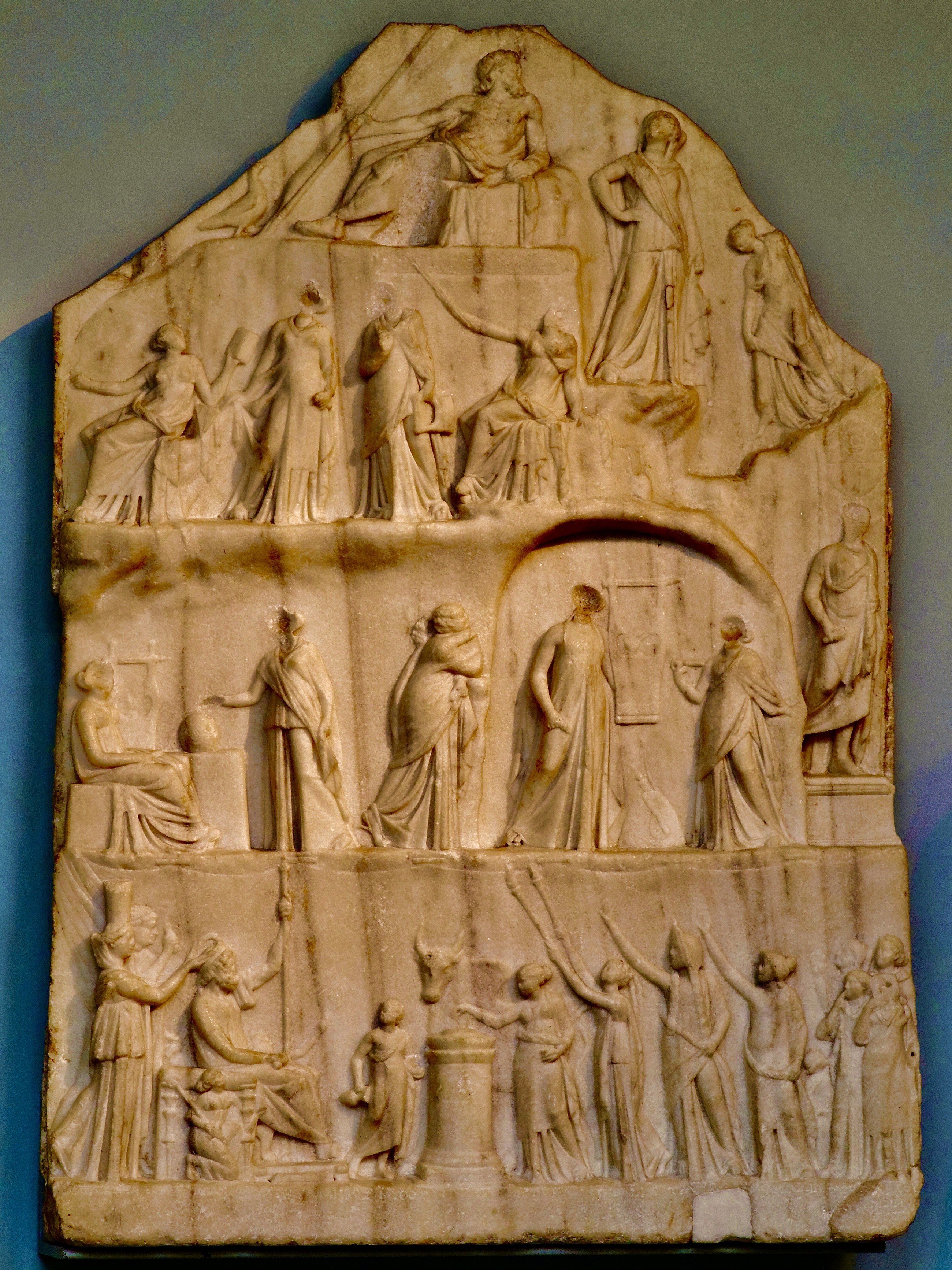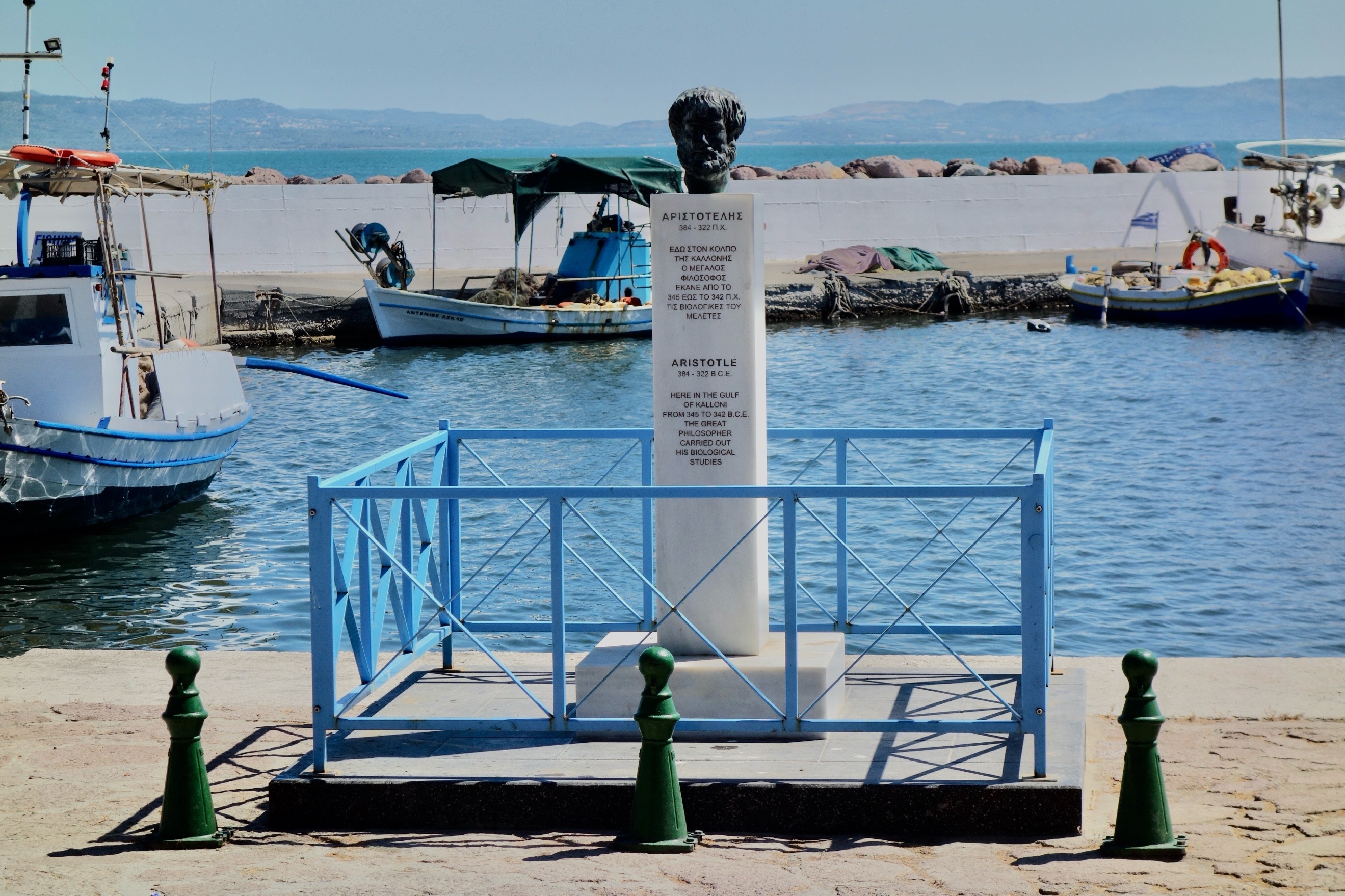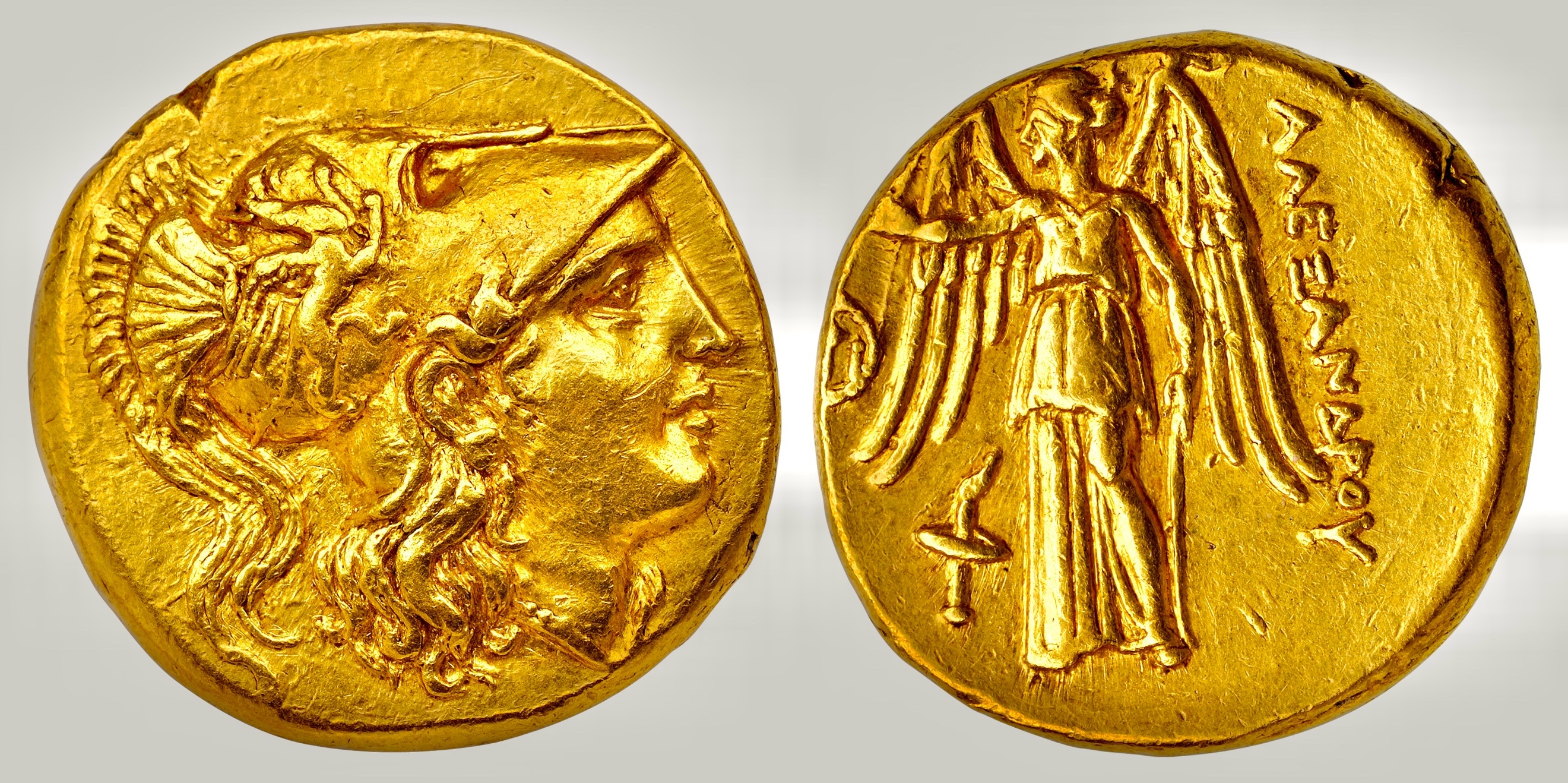Homer, Aristotle, and Alexander the Great

Apotheosis of Homer by Archelaos of Priene, c. 225 BCE. BM. Public Domain.
Prologue
More than any other Greek, Homer (The Poet), Aristotle (The Philosopher), and Alexander the Great (the military genius and pillar of Hellenism), made Hellas / Greece equivalent to civilization.
The epics of Homer
The epic poems of Homer inspired the Greeks for millennia. The first epic, the Iliad, tells the story of the Trojan War, according to which, about hundreds of Achaean / Greek ships from all over Hellas carried soldiers to Troy in Asia Minor in order to avenge the abduction of Helen by Paris, a prince of Troy. Helen was the daughter of Zeus and wife of King Menelaos of Sparta. This woman was so beautiful that all important leaders of Greece wanted her for wife. But Menelaos won the lottery. To maintain peace, the unlucky suitors of Helen promised that if anyone tried to take Helen away from Menelaos, they would come to his aid.
The Iliad, however, is much more than a story of the terrible and “evil” Trojan War. It’s about the wrath of Achilles, the Greek superhero and son of sea goddess Thetis. Athena restrained Achilles from killing the commander-in-chief Agamemnon who took away his beloved woman Briseis. Angry Achilles did not fight with the result the Trojans almost won. The Iliad is also a mosaic of Greek life, the hateful war that killed so many young men; the plunder of the soldiers for living; the anger and division of the gods, some supporting the Greeks and others supporting the Trojans. The Iliad is a powerful anti-war story. Yet it is, in addition, a panorama of the Greek vision of the natural world and the heavens. The Iliad is encoded with advanced science and technology from a very distant Greek civilization.
The other epic of Homer is the Odyssey, a story of heroism and adventure of Odysseus, King of Ithaca, a tiny island in the Ionian Sea, west of mainland Greece. Unlike other leaders like King Nestor of Pylos of Peloponnesos who sailed home, Odysseus was lost from the very beginning of his return home trip. This gives a wonderful opportunity to Homer to paint a fantastic journey through unknown seas and lands, monsters, cannibals, tempting Sirens, women-like birds, singing irresistible songs, and surviving terrible natural phenomena and storms. Crafty and indomitable Odysseus even came across Calypso, an attractive goddess who wanted him all to herself. She promised him immortality if only he stayed with her. Goddess, he said to her, you are beautiful, and I love you. But I want to return home. Another more powerful goddess, Athena, heard Odysseus and came to his aid. She spoke to her almighty father Zeus to intervene. Zeus did. And soon thereafter, Odysseus returned home to his wife Penelope who was waiting for him for some 20 years.
The Iliad and the Odyssey describe a world full of very interesting and courageous people, a beautiful natural world, and a Cosmos definitely connected to the people of the Earth. The stars were both gods and agents of harmony and beauty, inspiring awe, curiosity, and science. For example, the Sun god Helios and his sister Selene, the Moon, determine day and night, the length of months and years. They shaped all human calendars. Their temporary eclipses from the heaven were omens of misfortune. So, the Greeks studied the heavens carefully and eventually, in the second century BCE, constructed an astronomical computer, a Meteoroskopeion, to predict those eclipses.
The epics of Homer were probably the first written texts about the Greeks of the Bronze Age. They explained the origins and course of Greek history and civilization. They said enough about the gods to make them familiar. They offered models of courage and heroism. Achilles and Odysseus and Diomedes became paradigmatic heroes. Homer’s description of birds, other animals, lands, seas, constellations, the Sun, and the Moon made up the first Greek exploration of nature. No wonder that Homer became the teacher of the Greeks.
Aristotle and Homer

Marble bust of Aristotle in the Kalloni Gulf of Lesbos, where Aristotle did his biological research. Photo courtesy Ioannes Hatzopoulos
The great tragic poets of the fifth century BCE, Aeschylos, Sophocles, and Euripides borrowed their stories from Homer. But the Greek thinker who read Homer for knowledge and inspiration was Aristotle. There are about 800 years separating Aristotle from Homer. Aristotle flourished in the fourth century BCE. Eratosthenes, the head of the Alexandrian Library in the third century BCE, calculated that Troy was burnt by the victorious Greeks in 1183 BCE. So, the Trojan War must have taken place sometime in late 12th century BCE. This date corresponds with modern astronomical confirmation of a solar eclipse in the Odyssey (20.356-357). Eratosthenes was a polymath: mathematician, geographer, poet, and historian. He measured the circumference and the axial tilt of the Earth. He also founded the science of the measurement of time or chronology. He had read Homer and Aristotle very carefully.
Aristotle also read Homer. In all likelihood, neither Eratosthenes nor Aristotle speculated when Homer lived, though both must have concluded Homer was alive not much later than the Trojan War. We know that the Roman Emperor Hadrian asked the Oracle at Delphi to report on Homer. The priestess of Apollo said that Homer was the son of Telemachos, who was the son of Odysseus. His mother was Polykaste, who was daughter of Nestor, King of Pylos, and colleague of Odysseus in the Trojan War.[1] So, Homer was the grandson of Odysseus. This explains the details and philosophy of the epics. Telemachos learned from Odysseus and Polykaste, and he passed on that knowledge to his son Homer.
We don’t know if Aristotle had reached similar conclusions about the origins of Homer. But we know Aristotle thought of Homer very highly. Like other Greeks, he had no doubt Homer was a divine poet and teacher. He cited him repeatedly in his political, philosophical, and scientific works. Both Homer and Aristotle were polymaths. The world was their text. Aristotle went to the epics of Homer for inspiration, knowledge, and confirmation of his own view of the Greeks and the Cosmos. Aristotle taught politics and philosophy and science to young Alexander, son of King Philip II of Macedonia. He also instructed Alexander Homer. In fact, he edited the Iliad for Alexander who also loved Homer and especially the superhero Achilles.
The Persian factor
The teaching of Alexander by Aristotle took place during an opportune and dangerous time, late fourth century BCE. The Persians were still involved in Greek political life that bothered Aristotle. He urged his young pupil to do two things. Unite the Greek poleis (city-states) and end the Persian danger. Alexander did both. In the Battle of Chaeronea (338 BCE in Central Greece), he joined his father and defeated a force of Athenians and Thebans, thus uniting most Greeks, save Spartans, under Macedonian hegemony.
Two years after Chaeronea, in 336 BCE, Philip II was assassinated by one of his guards. Alexander became King Alexander III. In 334 BCE he invaded Persia, and, in a few years, he conquered that vast empire. With Aristotle and Homer in mind, Alexander set the foundations of a global commonwealth for the spread of Greek culture. On his way to fighting the Persian enemy, he stopped at Ilium / Troy to pay respects to Homer and Achilles, his model for strategy and heroism. His military campaigns showed him to be a military genius with a vision for a better world. He founded Alexandria in Egypt as the capital of his empire.
Alexander the Great

About 322-318 BCE. Gold stater issued in Sardes (Sardeis, Sart), key city of Lydia, which became a province of Persia. Alexander used Sardes for his mint. Nike, right, is crowning the victories of Alexander. Courtesy Numismatic Museum, Athens. Collection Saroglou.
Alexander accomplished so much so soon so young that he rightly earned the honor of greatness. Books and documentaries continue to bring him back to life. The latest film is that of a 6 hour Netflix documentary, Alexander: The Making of a God. The documentary was largely historical and acted well. However, Netflix rewrote history with its shameful making Alexander a homosexual. Another falsehood was having Alexander kneel in front of Egyptian priests and representatives of the Persian King Darius. Alexander was a king. His generals and troops did not kneel in front of him. The Greeks refused to kneel or bow their heads to any authority, including the authority of Greek kings.
The Legacy of Homer, Aristotle, and Alexander
Alexander was definitely a hero and a genius. His mother tried to convince him he was the son of Zeus. Alexander loved and trusted his mother. He probably assured himself he was the son of Zeus. Achilles was the son of goddess Thetis. But the young man loved Aristotle and that knowledge and inspiration from that great philosopher gave him the vision of spreading Hellenic science and civilization the world over. His general Ptolemaios, who was also a student of Aristotle who became a king of Egypt, materialized the dream of Aristotle. He built a Mouseion-university and a library in Alexandria. He opened the doors of these institutes for advanced studies to the best Greek minds. The result of that enlightenment was astonishing. It made our world. Alexandria became the capital polis of civilization for several centuries in the Mediterranean. And that really was the legacy of Homer, Aristotle, and Alexander.
Alexander’s ecumenical vision
Yet, there’s another, even greater assessment of Alexander dreaming to create a united humanity, oecumene / ecumene, in effect a world society and government under the rule of reason. This interpretation of Alexander comes from a Greek living in the Roman Empire that had abolished Greek freedom, conquering Greece in 146 BCE and making it a province of Rome. Plutarch was that voice. He was a Greek philosopher, prolific writer, and a priest of Apollo. He lived from about the second half of the first century to the first twenty of so years of the second century of our times. He served Rome but remained Greek. He said that Plato, Aristotle, and other thinkers like the Stoic Zeno wrote and taught how to live in ideal cities but never translated their ideas into political reality. Alexander did. He conquered Asia, but his purpose was more than warfare. He dressed like the Asians, and he tried convincing his officers to marry Persian women. Alexander married a princess from Afghanistan. He also established dozens of cities in Asia, all of them governed by justice and the rule of law, thus eliminating injustice in large regions of his empire. Plutarch argues correctly that the conquest of Alexander brought peace, justice, and civilization to Asia. “[Without Alexander,] Says Plutarch, “Egypt would not have Alexandria, Mesopotamia would be without Seleucia, Sogdiana would not have Prophthasia, India would be without Bucephalia, and the Caucasus would be without Alexandria in the Caucasus. It was by living as citizens of these cities that the bad and unacceptable were extinguished. The lives of the citizens improved by familiarity with better ways of living. Philosophers pride themselves in refining the brutal and boorish aspects of human nature. Alexander did what philosophers say they do. He succeeded in reforming the bestial nature of countless nations. He certainly is a great philosopher…. Alexander believed that the gods sent him to unite the world and create one commonwealth of equality and justice and civilization.”[2]
Alexander was a revolutionary. In trying to reform his empire and add non-Greeks to Greek culture, he faced resistance from his Greek officers and the local elites in Asia. After all, for the first time in history a conqueror abandoned violence as a governing principle. Alexander wanted to convince the vast majority of the conquered people he was their friend. He joined Europe and Asia by marriages, similar clothing, and the equal administration of justice and by founding Greek cities all over Asia so Asians could see the difference.
1. Anthologia Palatina 14.102. ↑
2. Plutarch, On the Fortune of Alexander, Discourse 1, 5-8. ↑

